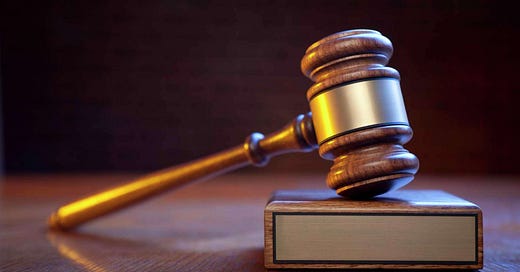Senate leader: ‘Thank you, next’ on Hochul judicial nominations, CapCon Q&A with N.Y. I.G. Lucy Lang
Plus: N.Y. could move all elections to even years and what else you heard at the Capitol Wednesday.
Good afternoon — it’s Wednesday and Paperclip Day.
WEDNESDAY, MAY 29, 2024
TODAY’S CAPCON:
Why end-of-session judicial nominations are worth watching
Will N.Y. move all elections to even years?
What else you heard at the Capitol Wednesday
CapCon Q&A with Inspector General Lucy LANG
🔨 Is Tomorrow a Session Day? Yes.
🌞 Tonight’s Weather: Albany: Chance of rain, mid-50s. New York City: Rain likely, low 60s. (National Weather Service)
⚖️ Judicial nominees could be rushed through in the remaining days of session
🧑⚖️ Hochul’s office hasn’t said who they plan to send to the Senate for confirmation to judgeships over the next week, or when.
New York doesn’t have enough trial court judges to handle the amount of cases filed with the state court system each day — that’s something attorneys, lawmakers and judges all agree on.
When judges are on the ballot, you’re voting for justices of state Supreme Court and, outside New York City, Family Court. Local city, town and village justices are also elected.
But judges on some courts are, instead, selected and nominated by the governor. Those include the Court of Appeals, the Appellate Division and the Court of Claims.
We’re going to focus on the Court of Claims for this one and I wrote a bit about this a few weeks back.
The Court of Claims exists to handle cases in which someone is seeking damages from the state.
But in recent years, it’s also existed for a different reason: to help tackle the state’s backlog of cases that the rest of the roster can’t get through.
⚖️ But, how does that work if they only handle cases against the state?
That’s the thing — while the Court of Claims has a narrow jurisdiction, the justices who sit on it often do not.
That’s because those judges are often appointed by top court officials as acting justices with state Supreme Court.
That gives them jurisdiction over the same kinds of cases as elected justices with the state Supreme Court.
So, you have this system in which most of the justices that handle cases at the trial court level are elected by voters, but others are appointed by the governor and have the same power.
🏃 Take Anthony Brindisi. Remember Anthony Brindisi?
Brindisi was a Democrat in the Assembly, then served a term in Congress before losing reelection in 2020 to current U.S. Rep. Claudia Tenney, a Republican.
After Brindisi lost reelection, he decided to run for state Supreme Court — which is the trial level court for those not legally minded.
But Brindisi lost that race, dashing his hopes of serving on the bench — temporarily.
Two years ago, Gov. Kathy HOCHUL appointed Brindisi to the Court of Claims.
But a quick search of the cases before Brindisi shows that he’s now serving as an acting justice of the state Supreme Court. Full circle!
🏛️ So, why does it matter that these judges have dual roles?
Judges on the Court of Claims, as mentioned, are nominated by the governor — but they also have to be confirmed by the state Senate.
And in recent years, the Senate has been more deliberative in how it confirms judicial nominees.
That’s different from many years in the past decade in which the Senate moved judicial nominees quickly, and usually without any scrutiny.
So, at some point in the next eight days, they’re expecting Hochul to send up a list of nominees for them to consider and a significant chunk up them are expected to be for the Court of Claims.
Those could be new nominees, or Hochul could just renominate some of the same judges.
Take Court of Claims Judge Marcia Hirsch from Queens.
She was first appointed to the Court of Claims in 2005 by Gov. George E. Pataki, and then renominated by Gov. Andrew M. Cuomo in 2013.
Hirsch is one of several judges whose terms have expired. Her term expired in 2022, but, like others, she's remained on the bench.
🪨 The Senate is between a rock and a hard place
It’s become the norm for governors, including Hochul, to hand down their judicial nominations in the final days of session.
Cuomo did this as well. I remember covering those nominations when I was at the New York Law Journal.
That leaves the Senate with two choices: confirm those nominees and keep the courts staffed or leave for the year without considering them.
And if they do consider the nominees, which is far more likely than not, members of the Senate will have to rush them through committee and get them to the floor before session ends.
So, the deliberative process they’ve used for judicial nominees to the state’s highest court likely won’t be possible here.
At least a dozen nominations are expected and members (literally) wouldn’t have time to get through them all if each nominee took questions for hours in committee.
🗣️ Okay, that was a lot. So, what’s the Senate saying about it?
Keep reading with a 7-day free trial
Subscribe to Capitol Confidential with Dan Clark to keep reading this post and get 7 days of free access to the full post archives.






